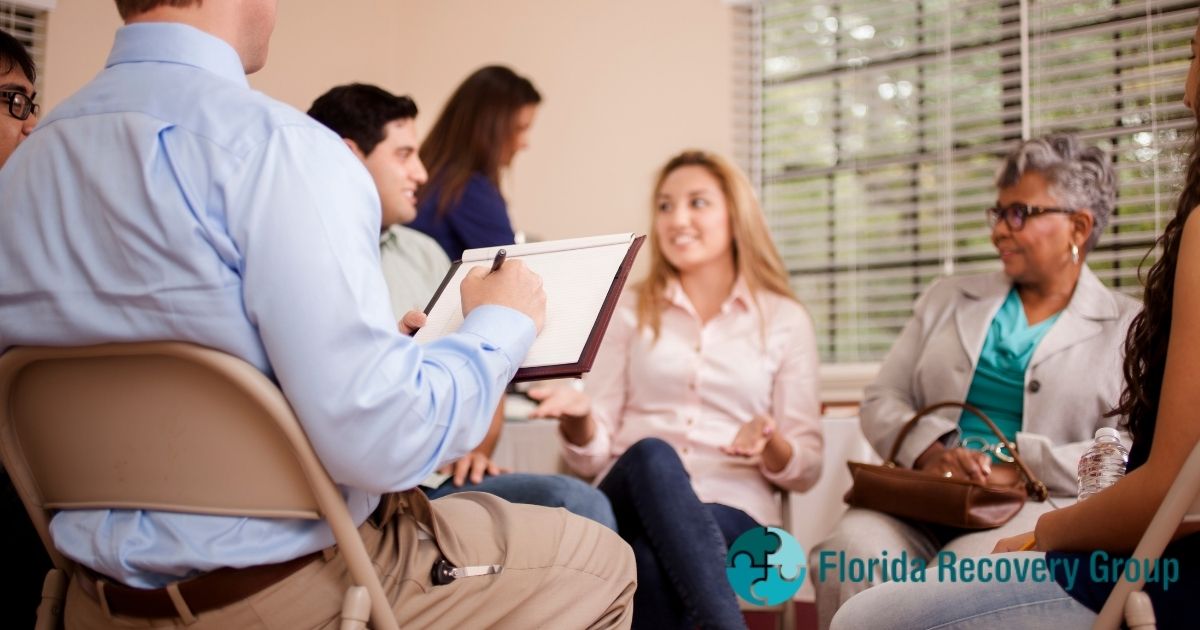
10 Mar What to Expect During Dual Diagnosis Treatment in Delray Beach
Co-occurring disorders are characterized by an individual having a substance use disorder and at least one additional mental health condition. For example, an individual who suffers from alcoholism and bipolar disorder has co-occurring disorders.
According to the Substance Abuse and Mental Health Services Administration, “approximately 9.2 million adults in the United States have a co-occurring disorder.”[1]
Treating co-occurring disorders can be complicated, however, dual diagnosis treatment programs possess the necessary techniques to help individuals fully recover.
Despite co-occurring disorders being extremely common, many people are unsure of what to expect during dual diagnosis treatment in Delray Beach.
Who Should Attend a Dual Diagnosis Rehab Center?
Anyone who suffers from addiction and a co-occurring mental health condition would benefit from a dual diagnosis program. However, sometimes it can be difficult to identify the signs of co-occurring disorders.
Oftentimes, the symptoms of mental health conditions and substance use disorders overlap. This is why many individuals are unsure about whether they need dual diagnosis treatment or not.
If an individual identifies with the following statements, integrated treatment for mental health and addiction is probably necessary:
- Using drugs to cope with uncomfortable feelings or painful memories related to trauma from the last
- Feeling satisfied with life is something that has become difficult without the help of drugs or alcohol
- Using substances to cope with stress, fear, anxiety, depression, or any other painful emotion
- The family has a history of mental illness
- Holding a job or completing daily responsibilities is difficult due to substance abuse or mental health-related issues
- Struggling with mood swings, bouts of anger, anxiety attacks, or severe phases of depression.
- Socially and emotionally withdrawn from friends and family members
There are several other signs of co-occurring disorders, as there are many mental health conditions an individual could be suffering from. However, anyone dealing with severe emotional distress and addiction usually meets the criteria to attend a dual diagnosis treatment program in Delray Beach.
What is Dual Diagnosis Treatment Like in Delray Beach?
Integrated treatment works by treating the individual’s addiction and mental health condition(s) simultaneously. This prevents one condition from causing a relapse in the other.
Treatment for co-occurring disorders usually involves medical detox, management of psychiatric medications, behavioral therapy for addiction and mental health, and relapse prevention planning.
Medical Detox
Similar to regular addiction treatment, dual diagnosis programs begin with medical detox.
Individuals who are addicted to drugs or alcohol will experience symptoms of withdrawal upon quitting the substance. Medical detox helps individuals overcome their withdrawal symptoms in a safe, comfortable, and medically-assisted manner.
Medical detox uses FDA-approved medications to lessen the symptoms of withdrawal and prevent drug or alcohol cravings from occurring. Some patients may be tapered off of their substance of choice depending on the type of drug they are using. This is done to prevent any unnecessary symptoms or medical emergencies from arising.
Behavioral Therapy
Once an individual completes detox, they will move on to the psychological aspect of recovery. Dual diagnosis rehab centers use evidence-based behavioral therapies to treat both addiction and mental health conditions.
Examples of behavioral therapies used during dual diagnosis treatment include:
- Cognitive-behavioral therapy (CBT)
- Dialectical behavior therapy (DBT)
- Contingency management (CM)
- Motivational interviewing (MI)
- The matrix model
- 12-step facilitation therapy
- Family behavior therapy
- Gender-specific trauma therapy
Behavioral therapy helps individuals identify negative patterns of thought (related to addiction or mental health) and teaches them how to utilize healthy coping mechanisms. This prevents individuals from turning to drugs or alcohol to self-medicate their mental health conditions or past traumas.
Medication Management
Individuals who struggle with mental health conditions may require psychiatric medication. This is on a case-by-case basis and medication is only given to individuals who need extra help managing their symptoms.
For example, individuals suffering from depression may require SSRI or SNRI medication to help their brains produce more serotonin and dopamine. On the other hand, some patients may be given mood stabilizers to provide them with a balanced and stable emotional state.
Medications provided to individuals will be non-narcotic, preventing them from falling back into the cycle of addiction. Most individuals may only take medication on a short-term basis, unless they require long-term pharmacotherapy treatment.
Relapse Prevention Planning
Before an individual completes rehab, they will work with their therapist to create a relapse prevention plan. Recovery from co-occurring disorders is an ongoing, lifelong journey. That’s why Delray Beach substance abuse treatment programs want to ensure their patients are prepared for recovery in the real world.
Relapse prevention plans typically include the following:
- Recovery goals that keep the individual focused on a happy future
- A list of addiction and mental health triggers
- Warning signs of relapse for addiction and mental health
- Plans for weekly or biweekly therapy
- Ways to stay accountable for taking medications, attending therapy, staying sober, etc.
- Addiction recovery meetings to attend (AA, NA, SMART Recovery, etc.)
- Sober supports to call when times get tough
- A plan of action in case of a mental health emergency or addiction relapse
Attend a Top-Rated Dual Diagnosis Treatment Facility in Delray Beach
Individuals who suffer from co-occurring disorders should always attend a dual diagnosis treatment program rather than traditional treatment. Thankfully, programs like Florida Recovery Group have created individualized treatment plans to address both addiction and mental health recovery simultaneously.
If you or a loved one suffer from addiction and the symptoms of a mental health condition, Florida Recovery Group is here to help. Contact us today to begin your recovery journey.
References:





